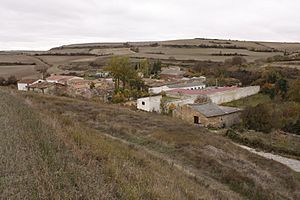Manciles facts for kids
Quick facts for kids
Manciles
|
|
|---|---|
|
Municipality and town
|
|

View of Manciles, 2009
|
|
| Country | Spain |
| Autonomous community | |
| Province | |
| Comarca | Odra-Pisuerga |
| Area | |
| • Total | 6 km2 (2 sq mi) |
| Elevation | 885 m (2,904 ft) |
| Population
(2018)
|
|
| • Total | 22 |
| • Density | 3.7/km2 (9.5/sq mi) |
| Time zone | UTC+1 (CET) |
| • Summer (DST) | UTC+2 (CEST) |
| Postal code |
09133
|
| Website | http://www.manciles.es/ |
Manciles is a small and peaceful town located in the province of Burgos, which is part of the Castile and León region in Spain. It's a place where you can find quiet streets and traditional Spanish charm.
In 2018, a census (a count of people) showed that Manciles had a population of only 22 people. This makes it a very small community, perfect for those who enjoy a calm environment.
Contents
Geography of Manciles
Manciles is situated in the Odra-Pisuerga area, a region known for its natural beauty. The town sits at an elevation of 885 meters (about 2,903 feet) above sea level. This higher elevation often means cooler temperatures and nice views of the surrounding countryside.
Location and Surroundings
The town covers an area of about 6 square kilometers (around 2.3 square miles). It's surrounded by the typical landscapes of the Burgos province, which often include fields and small hills.
Life in Manciles
Life in a small town like Manciles is very different from living in a big city. With only 22 residents, everyone likely knows each other, creating a strong sense of community.
Daily Life and Community
In small towns, people often rely on each other for support. Daily life might involve farming or other traditional activities. The quiet atmosphere makes it a great place to relax and enjoy nature.
How Manciles is Governed
Like all towns in Spain, Manciles is a municipality. This means it has its own local government that helps manage the town's services and needs.
Local Administration
Even with a small population, Manciles has a local council or mayor. These leaders work to make decisions that benefit the community, such as maintaining public spaces or organizing local events.
Images for kids
See also
 In Spanish: Manciles para niños
In Spanish: Manciles para niños


